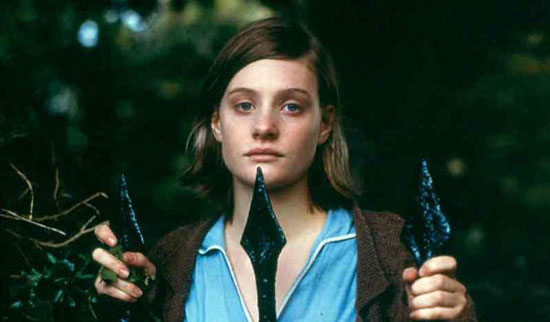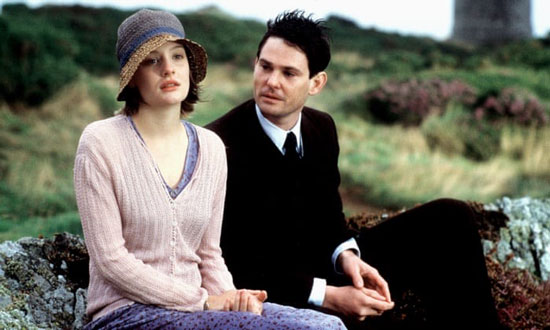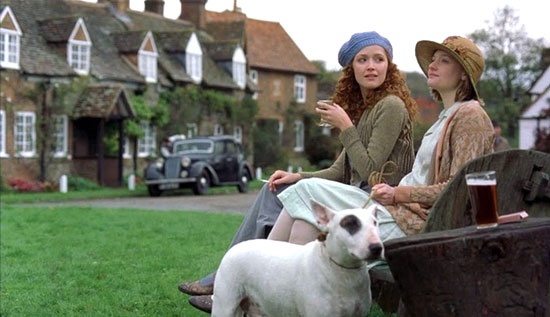Last Updated on February 24, 2022
“I Capture the Castle,” based on Dodie Smith’s first novel published in 1948, tells the story of a pivotal couple of months in the life of seventeen-year-old narrator Cassandra Mortmain and her eccentric, impoverished family as their world collides with that of their rich American neighbors, the Cottons. Desperate to escape poverty, Cassandra’s sister pursues the elder son, and all the Mortmains’ lives are forever changed.

To help keep this site running: Willow and Thatch may receive a commission when you click on any of the links on our site and make a purchase after doing so.
At first glance, the story seems like a retelling of a Jane Austen marriage plot, concerned as it is with the limited ability of women to improve their circumstances. But the second half reveals the real thrust of the narrative, which is Cassandra’s painful transition from naïveté to a deeper understanding of people, relationships, and love.
“I Capture the Castle” (2003) is a beautifully shot, impeccably acted film that, despite an occasionally over-earnest tone, will appeal to fans of the book and lovers of British interwar period dramas.
When “I Capture the Castle” (2003) begins, the Mortmain family lives in a moldering castle deep in the Suffolk countryside, evidently an idea of the father’s, James Mortmain (Bill Nighy, Emma.).
Once a promising author, James wanted to write masterpieces among the battlements but has suffered a persistent, years-long case of writer’s block. The family now lives in picturesque poverty, the royalties from the book having run out.
Fed up with her circumstances, Cassandra’s (Romola Garai, The Crimson Petal and the White) older sister Rose (Rose Byrne, Casanova) sets out to marry the castle’s new landlord, Simon Cotton (Henry Thomas, Legends of the Fall). The whole family rallies to the cause, becoming increasingly enmeshed with the Cottons and their more worldly way of life.
Once engaged, Rose sends money home to put food on the table for her family, and can finally indulge in the privileged life she always wanted: living in London, wearing couture, and going out dancing. James finds the respect and intellectual stimulation he lacks at home by meeting regularly with Simon’s mother Elspeth Cotton (Sinead Cusack, North & South) to discuss ideas for a second novel. And Cassandra begins to experience the pleasure and heartache of a more complicated world beyond her quiet life in the castle.

But all is not as it appears. As Rose falls out of love with Simon, Cassandra falls in, made all the more painful by a blissful evening she spends with him when he returns to the castle on Midsummer’s Eve. Her developing feelings make her all the more uncomfortable with the idea that Rose is likely marrying him for his money.
Meanwhile, James’s marriage is strained by his relationship with Elspeth, even as she doubts he will ever write again. And Cassandra’s developing feelings for Simon complicate her friendship with hired man Stephen (Henry Cavill, Enola Holmes), who loves her but has begun an affair with someone else. No one is happy.
Cassandra tells Stephen, “It’s like some hideous party game where everybody’s dancing but no one is getting the prize they want most because it’s all third-hand and second-best. I can’t bear it.”
While some characters end up with their desired partners by the end of the film, this is ultimately a coming-of-age story, where growth is more important than a happy ending. The lessons learned–that a kiss can mean a lot of things, not all of them positive; that heartbreak is survivable; that being in the presence of a beloved might not be enough if one isn’t sure one is truly loved–are made all the more poignant with the affecting combination of Romola Garai’s wistful narration and Dario Marianelli’s soundtrack.
Garai expertly captures the feelings of a young girl inexperienced in love. She is the voice of the film, as if reading from the pages of the journal that she is seen writing in. The viewer is privy to all of her innermost thoughts, preserving the wit and charm of the novel, and those thoughts bring out Cassandra’s rich inner life even as her character’s role in the family is to “keep a lid on things.”

Occasionally Cassandra’s observations and Garai’s earnest tone veer close to melodrama, putting too much emphasis on the bruising process of growing up and not enough on the practical problems her family faces. The Mortmains’ poverty is severe: before meeting Simon, Rose contemplates going on the streets until she realizes she hasn’t the train fare to get to London, where prostitution would be more profitable than in the countryside. And James’s treatment of his family ranges from neglectful to downright abusive.
In both the novel and the period drama, James is briefly incarcerated for threatening his wife with a cake knife. The scene in the film–which is likely a fairly accurate depiction of the real-life event–is more frightening than the somewhat light-hearted description in the novel. That artistic decision makes more sense for modern audiences, who will not find attempted domestic abuse amusing.
But for the most part, the film, like the book, treats these particular issues with a light touch, which is emblematic of the “just get on with it” attitude famous from that time. All of them (except Rose) look at their poverty as an inconvenience. They’ve managed not to pay rent in years. Cassandra’s stepmother Topaz attempts to refresh their tired wardrobes and dyes all of their clothes green, much to the family’s annoyance, but also exhibiting the resourcefulness of the interwar years in England. And the family largely regards James as an eccentric whose whims must be indulged.
“I Capture the Castle” is quite funny, and Cassandra gets some of the best lines. Discussing Rose’s infatuation with Elspeth Cotton’s luxurious bathrooms, Cassandra reminds her, “No bathroom on Earth will make up for marrying a bearded man that you hate!” Told that the sisters’ aunt has died and has left them a portion of her wardrobe, Cassandra says she hopes it’s the door. The camera then pans to the sorry state of the girls’ closet.
Shot on location in Wales, Pembrokeshire, Buckinghamshire, and the Isle of Man, the movie shows off the best of the English countryside. Lovers of British period drama will recognize names of those in front and behind the camera, including several major actors in some of their first roles (Garai, Byrne, Cavill) as well as the director, Tim Fywell (Grantchester, The Woman in White), and the screenwriter, Heidi Thomas (Call the Midwife).
Charming, visually appealing, and enjoyable whether you have read the book or not, “I Capture the Castle” is sure to capture your heart.
“I Capture the Castle” (2003) is AVAILABLE to STREAM
Rated R for brief nudity
Alyssa Murphy is a freelance writer living in Alexandria, Virginia. She has worked in communications for education, economic independence, and environmental nonprofits and was the editorial manager for a child psychiatry journal. In her free time, she enjoys listening to dramatized Agatha Christie mysteries and studying grand English country houses.
If you enjoyed this post, wander over to The Period Films List. You’ll especially like the Best Period Dramas: Interwar Era list.


Michelle Braverman
March 13, 2022 at 8:16 pm (2 years ago)“I Capture the Castle” has long been one of my favorite novels. Amazingly this is a wonderful adaptation, very true to the book with wonderful period sets and detail. Great performances by all and a real delight.